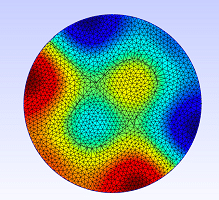
The projet X-MESH ‘An eXtreme Mesh deformation method to follow sharp physical interfaces’ was selected in the call for projects ERC Synergy Grant 2022. This project was submitted by Nicolas Moës, professor at GeM-Centrale Nantes, and Jean-François Remacle of the Catholic university of Louvain (Belgium). Nicolas Moës’ close collaborators at GeM on the project are Nicolas Chevaugeon and Benoit Lé.
X-MESH is an innovative approach that aims to overcome a major difficulty associated with engineering analysis: by providing a revolutionary way to track physical interfaces in finite element simulations using extreme deformation of the meshes.
The key idea is to allow elements to deform up to zero measure. For example, a triangle can deform to an edge or even a point. This idea is rather extreme and totally revisits the interaction between the meshing community and the computational community, who, for decades have striven to interact through beautiful meshes.
Six areas in fluid and solid mechanics as well as heat transfer are targeted. Interfaces will be either material, i.e., attached to particles of matter (the interface between two immiscible fluids or the dry interface in a wetting and drying model) or immaterial, i.e. migrating through the material (solidification front, contact front, yield front or crack front).
Advances are expected from this X-MESH method in the following engineering fields: safety design and maintenance, manufacturing processes, coastal engineering, energy efficiency, ocean modeling, to name but a few.
► Learn more about the project
Nicolas Moës


